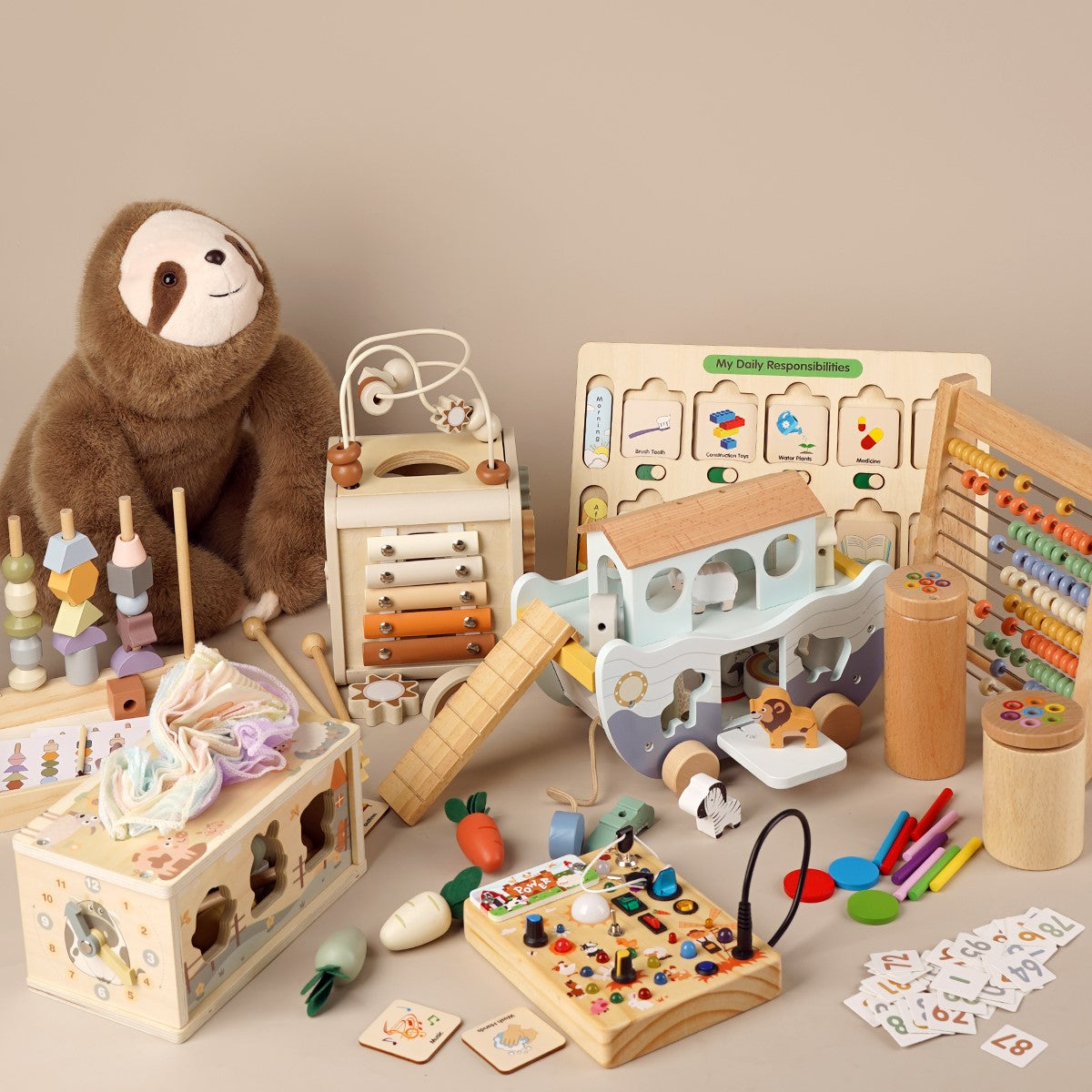Why Wooden Toys are Essential for Early Childhood Growth
 Why Most Montessori Toys Are Wooden
Why Most Montessori Toys Are Wooden
Montessori toys are intentionally designed to align with the Montessori philosophy of education, emphasizing the importance of fostering independence, creativity, and holistic development in children. One of the most distinctive features of Montessori toys is their wooden construction, which is not merely a stylistic choice but rather a purposeful decision rooted in the principles of this educational approach. Wooden toys are cherished in the Montessori classroom and playroom for the natural benefits they provide, both in terms of a child’s development and their connection to the world around them.
The simplicity of wooden toys serves a crucial function in Montessori education. Unlike many modern toys made from plastic with flashy lights, sounds, and often complex features, wooden toys embrace minimalism. Their simplicity invites children to explore their own imagination and creativity. Rather than being passively entertained, children actively use wooden toys to build, create, and solve — an approach that aligns with the Montessori goal of engaging children in focused, meaningful play. For instance, a set of wooden blocks can transform into anything from a tower to an imaginative woodland scene, encouraging children to take the lead in their learning.
How Wooden Toys Contribute to Child Development
Wooden toys, with their simplicity and timeless charm, have been a staple in children's playrooms for generations. Beyond their aesthetic appeal, these toys offer rich developmental benefits, spanning cognitive, emotional, and social growth. Here's why wooden toys are not just fascinating playthings but vital tools for nurturing young minds.
1. Fostering Cognitive Skills
Wooden toys stimulate critical thinking, problem-solving, and logical reasoning. For example:
- Building blocks enhance spatial awareness and understanding of geometry.
- Shape sorters and puzzles boost hand-eye coordination, fine motor skills, and problem-solving abilities. By sorting shapes or fitting puzzle pieces, children engage in trial and error, thereby developing resilience and perseverance .
2. Enhancing Motor Skills
Wooden toys often require hands-on engagement, which supports motor skills:
- Activities like stacking blocks and assembling wooden figures improve grip and dexterity.
- Such toys lay the foundation for later skills involved in writing or handling small objects .
3. Encouraging Imagination and Creativity
Wooden toys inspire open-ended play due to their simple designs:
- A wooden block can transform into anything a child imagines—a car, a house, or an animal.
- Unlike electronic toys that dictate how they are used, wooden toys foster creativity, storytelling, and role-playing .
4. Promoting Emotional and Social Growth
Playing with minimalist wooden toys helps children manage their emotions and form social skills:
- Collaborative play with toys like wooden building sets promotes teamwork and sharing.
- When children interact with wooden figurines or dollhouses, they often narrate stories, which aids in understanding empathy and relationships .
5. Reducing Overstimulation
Unlike many modern plastic and electronic toys with flashy lights and sounds, wooden toys provide a soothing, tactile experience. Their natural textures and muted colors minimize overstimulation, allowing children to focus more deeply and process emotions calmly .
6. Eco-Friendly and Safe
Many wooden toys are made of sustainable, non-toxic materials, making them safe for children and environmentally friendly. Parents can feel at ease knowing wooden toys are not contributing to plastic waste or exposing their kids to harmful chemicals .
Best Montessori Wooden Toys for Curious Minds
Montessori busy boards are expertly crafted, hands-on activity boards designed to stimulate young minds through tactile and sensory exploration. Made from high-quality natural wood, these multifunctional boards feature everyday objects like zippers, buttons, Velcro, locks, latches, switches, and gears, turning simple interactions into engaging learning experiences. Their thoughtful design aligns perfectly with children's developmental needs, fostering curiosity, problem-solving skills, and independent exploration. Among the vast array of Montessori toys, busy boards stand out as a uniquely valuable educational tool—blending simplicity, ingenuity, and natural materials to create endless opportunities for discovery.
1. Promotes Independent Play
Montessori busy boards are designed to encourage children to solve problems independently. Whether it's figuring out how a latch works or how to open and close a zipper, the busy board fosters a sense of self-reliance. It allows children to explore and take on new challenges in a safe and engaging way.
2. Stimulates Fine Motor Skills
Each element on a busy board is intended to enhance motor development. Turning knobs, sliding latches, and flipping switches engage a child’s tiny hand muscles and improve hand-eye coordination. As children manipulate these components, they gain valuable skills that lay the foundation for writing, drawing, and other manual tasks.
3. Encourages Sensory Exploration
With its combination of textures, materials, and movable parts, a montessori busy board provides a rich sensory experience. Children can touch, feel, and manipulate different items, enriching their sensory perception. This is especially valuable during early childhood when sensory exploration plays a key role in cognitive and emotional development.
4. Focus and Concentration
Busy boards are excellent tools for fostering focus in young minds. While engaging with elements like toggles, knobs, and bolts, children naturally develop concentration and patience. This is an essential skill that aligns with the Montessori philosophy of calm and mindful learning.
5. Engages Practical Life Skills
One of the core principles of a montessori education is teaching children practical life skills. By zipping, unzipping, buttoning, and sliding locks, children are practicing everyday tasks that promote independence and confidence in their abilities.
Final Thoughts
Childhood development is an intricate process, and the tools we provide can significantly influence learning outcomes. Wooden toys, far more than just nostalgic novelties, are developmental essentials. They support cognitive, motor, emotional, and creative growth, all while providing a calming and environmentally friendly playtime experience.
Choosing wooden toys for your child is about more than play—it's about building skills and nurturing a lifelong love for simple, meaningful learning. Explore their magic and see enduring benefits unfold in your child's development.
Maybe it will be helpful for you:
Recent Post

Buy Once, Play Longer with Joyreal Toys
“We’re tired of toys that only last a weekend.”“I want toys that gr...

Love Is Learning Together: Valentine’s Day Educational Toys by Joyreal
When we think of Valentine’s Day, our minds often drift to roses, c...

A New Year, A New Beginning: Joyreal Toys’ Wish for Every Child
A Heartfelt New Year Message from Joyreal Toys As we welcome 2026, ...

Can Montessori Wooden Toys Grow With Your Child From 1 to 4?
When Your One-Year-Old Plays for Two Minutes and Walks Away It’s a ...

Mini Piano or Drum Set — Which Is Best for Kids?
As parents, we all face the same struggle — our children spend hour...

Is Phonics-Based AAC Right for Your Nonverbal Child?
Why Nonverbal Children Need AAC Devices For many parents, finding a...

Picture-Based AAC or Phonics AAC? A Parent’s Guide
Phonics vs Picture-Based AAC: Which Communication Tool Is Right for...

How Does Music Enlightenment Work for Ages 0–3?
Why Age-Specific Music Enlightenment Matters (0–3 Years) The first...

What Age Is a Noah’s Ark Toy For?
Is a Noah’s Ark Toy Good for Toddlers (Ages 1, 2 & 3)? When par...

Why Noah’s Ark Is More Than Just a Story Toy?
When parents search for a wooden Noah’s Ark toy, they’re usually no...











